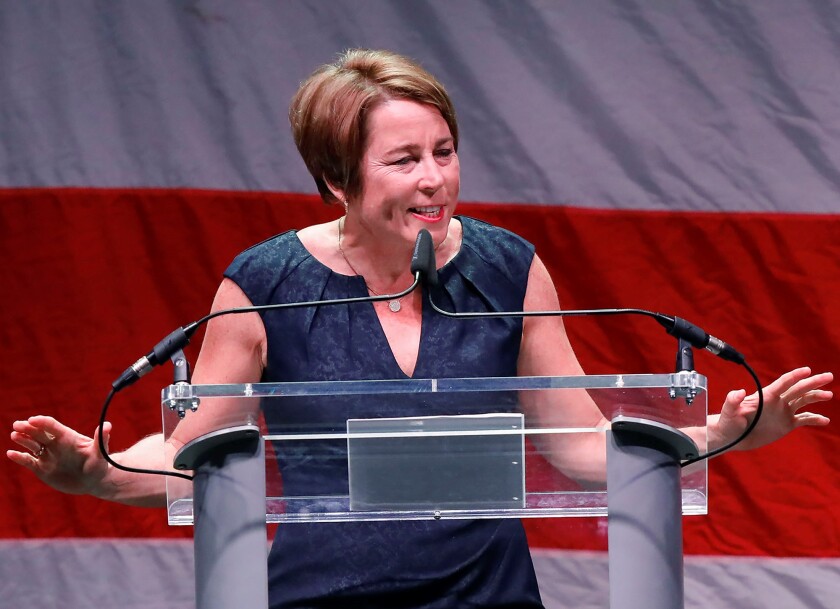The confidential hotline — tailored specifically to health care providers, caregivers and patients in Massachusetts — is available is at 833-309-6301, delivering free legal advice and resources. People staffing the hotline, including pro bono attorneys, will aim to return calls within two to three business days, though users can indicate if a matter is urgent and needs a swifter response.
“One of the results of the Dobbs decision has been misinformation — misinformation about which services are illegal, deception about where to receive health care services, lies intended to discourage women from accessing reproductive care,” U.S. Sen. Elizabeth Warren said at an all-female press conference Monday morning alongside fellow elected officials and advocacy groups at Campbell’s office. “With this hotline, Massachusetts is fighting back against misinformation, deception and outright lies. This hotline ensures that both health care providers and patients can confidently go to one centralized place for free, to learn about the protections afforded to them under the law.”
Former Gov.Charlie Baker in late July signed into law a bill that’s designed to insulate providers and patients in the commonwealth, where abortion access is enshrined in the state constitution, from criminal prosecution and lawsuits from extraterritorial jurisdiction tied to states like Texas.
If that right is violated in Massachusetts, providers and patients have the ability to countersue. Under the law, insurance providers must cover abortion or abortion-related care without imposing deductibles, copayments or other cost-sharing requirements.
The legislation also outlines circumstances in which abortion is permitted beyond 24 weeks of pregnancy, including to preserve the life of the patient and if there is a “grave fetal diagnosis that indicates that the fetus is incompatible with sustained life outside of the uterus without extraordinary medical interventions.”
Lawmakers and activists Monday described the hotline as the next step in implementing the state law and tackling widespread confusion prompted by a patchwork of abortion bans and severe restrictions across the country.
Hotline users, who can remain anonymous, are encouraged to use Signal, an encrypted communications platform, to protect their messages and calls. The hotline went live at 7 a.m. Monday, said Rebecca Hart Holder, president of the Reproductive Equity Now Foundation, which created the hotline in partnership with other groups, including the Women’s Bar Foundation and the ACLU of Massachusetts.
“Our hotline will give our heroic abortion providers the legal resources they need to continue offering compassionate abortion care without fear, and it will help ensure that patients from places like Texas, Missouri or Indiana feel safe and protected when traveling to our commonwealth for care,” Hart Holder said. “Our hope is that this hotline will serve as an important legal resource for people to fully understand their legal rights and risks when obtaining or offering abortion, and ensure that Massachusetts remains a safe place for care.”
More than 150 lawyers from the ACLU of Massachusetts; Foley Hoag LLP; Goodwin Procter; Goulston & Storrs PC; Mintz, Levin, Cohn, Ferris, Glovsky & Popeo, PC; and Ropes & Gray LLP will provide free legal advice, she said.
Since Texas enacted its six-week abortion ban in September 2021, Massachusetts began to see Texans coming here for care, and the volume of out-of-state travelers expanded following the Supreme Court’s decision to overturn Roe, Hart Holder said. That influx, plus the state’s new abortion shield law, has spurred a flurry of questions from Massachusetts providers, such as to how stay safe, whether they could be arrested, and what would happen to their homes if they got sued.
The hotline, Hart Holder said, is “in response to very real patient and provider questions.”
Hart Holder told MassLive that Reproductive Equity Now worked with its legal counsel and a digital privacy firm to ensure all data collected on the hotline, such as a caller’s information and message, remains confidential.
“We are taking every single precaution and really sparing no expense to ensure that both patients and providers can feel safe, that their personal information will not be shared,” Hart Holder told MassLive.
U.S. Rep. Katherine Clark decried the “horrific consequences” of the Supreme Court’s decision last summer, such as patients being denied life-saving care and teenagers forced to go through with “state-mandated pregnancies.” In this time of uncertainty, Clark vowed that House Democrats will continue to fight against assaults on Americans’ liberties — and that Massachusetts will remain in a leader in abortion access.
“Extremists have put lives at risk, selling out the American people for a twisted vision of a country where freedom is reserved for a privileged view,” Clark said, as she called the new hotline a spark of hope. “This resource will empower women and health care providers to know their rights, to be able to exercise and defend their rights, and uphold fundamental dignity.”
U.S. Rep. Ayanna Pressley noted that one in four women will have an abortion by age 45, including people’s relatives, neighbors and fellow congregants at worship services.
“There is no shame in having had an abortion, and to those who seek abortion care, there is no shame in seeking an abortion,” Pressley said. “The only shame is that there are unrelenting, coordinated legislative efforts and forces at work to deny you that which is your fundamental right, and that is access to health care.”
Campbell, who was sworn into the attorney general’s post earlier this month, said she’s prioritizing her campaign pledge to create a reproductive justice unit, pooling together expertise from across her office to further protect abortion rights.
“Now it’s about delivering those promises to our voters, particularly as we see distrust between residents and government, so we are forging ahead to get that unit set up,” Campbell said. “And the goal of the unit is to be intersectional in the work to pull together folks across the various divisions and bureaus to really deliver health care services and to make sure we’re doing it with an intersectional lens.”
©2023 Advance Local Media LLC. Distributed by Tribune Content Agency, LLC.










